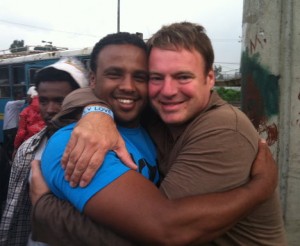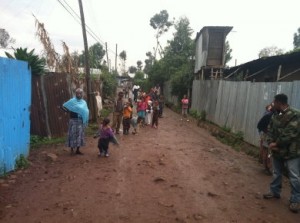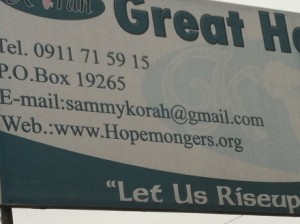A Story of Hope

Sammy and me
Since my blog about the Visiting Orphans trip I took to Ethiopia in August, I’ve received a lot of mail wanting to know more about the Korah community.
The story below of how it all began is pretty amazing so I thought I would share it with you.
Sammy, who is mentioned in the latter part of the article, is the guy who now runs the Great Hope Church where we were ministering for a week. He is an amazing man! So grateful to now call him friend!
Here’s the story, as printed at MyCrazyAdoption.org:
History of Korah

A street in Korah
75 years ago the village was established because of leprosy. The people came from the countryside to seek treatment for their illness. They came to Alert Hospital, which was established by Dr. Ross, from the U.S. and a Dutch doctor named Chris Dorman. When they heard of the spread of leprosy, these two men approached King Hale Selase to request land to establish a hospital specifically for the treatment of leprosy. King Hale Selase was willing to give land, but only land that was far from the town and in the forest as to keep the people with leprosy separate from everyone else.
The two doctors started the hospital and began treating these patients who had immigrated from the countryside. These infected people came to the city because their family members believed they were cursed when they contracted leprosy. Some of these individuals were put into a separate hut when their disease was discovered and later their family tried to light their hut on fire. The family members were so convinced that the leprosy was a curse that they were willing to kill their own children. Some escaped from these hostile family members and came to Addis for treatment.
Story of Liben
Liben was born into a big family in the countryside. He was the youngest of 7 brothers, so he was in charge of taking care of the cattle as a shepherd. He made sure they ate, stayed safe, and went to the river for water. Liben did not have shoes, like many children in the countryside, so he picked up the bacteria that causes leprosy. This is how leprosy spread throughout the countryside, basically because of a lack of shoes. Although he kept the illness a secret, his parents eventually found out that he had leprosy.
In response, his father ordered 4 of his brothers to take Liben into the forest and kill him. One day they took him out into the forest and he did not know where he was going. When they reached a hidden place, they began to beat him, and then shot him in the face. Thinking he was dead, they threw his body off of a cliff to hide what they had done. Amazingly, Liben was not dead. Thankfully, he was found by someone who knew of the Alert Hospital in Addis Ababa, who then sent him there for treatment. When Liben came to Addis, he went to the hospital for treatment and met Tsahi, who had also fled the countryside and came to Addis for treatment of leprosy. He came 400 kilometers and she traveled 600 kilometers to come to Addis, the only place where treatment was available.
Many people who came from such far off places walked, which only intensified their conditions. Liben and Tsahi were married shortly after they received treatment. To their great joy, they gave birth to a healthy son, Samuel and then 2 years later to a healthy girl, Tsega. They took up residence in the place where the hospital was established, which was called Korah. They, along with many others who received treatment at the hospital, chose Korah as their home, because they feared the rejection they had faced outside of this safe haven. Therefore, Korah became Ethiopia’s leprosy colony.
Doctors Ross and Dorman continued to serve this community that grew year by year as more people heard of the Alert Hospital. People are still coming to Alert Hospital today to receive treatment for their leprosy. When they come, they find a community who they can relate with and therefore Korah continues to grow. Together, this community faces much rejection from outsiders who refuse to truly understand their condition or former conditions. They face great challenges to find work because of stigma, and therefore the community is consumed with poverty. The village also lacked consistent water and power supply because it was seen as unimportant by those in control of such resources.
Doctors Ross and Dorman also built an elementary school for the children of the Korah community, because although they did not have leprosy, they were prohibited from attending school in the city. For those who never had the chance to receive an education, the two doctors began a handy craft project that trained the people of Korah to make crafts that could be sold for a profit. After King Hale Selase lost power, the Communist Dirge Regime took power and the lives of the people of Korah only worsened. The regime wanted those with leprosy to be eliminated. Therefore, the military base close to the colony would often send out soldiers to beat and even slaughter residents of Korah. They thought it was better if these “lepers” were dead.
Years ago, the impoverished people of Korah began sending their children to the nearby landfill (the king also put this far away from the city just like these people) to collect anything that seemed edible. To survive, these families consumed food that others had thrown away. This became their lives – waking every morning, running to the trash yard, and then fighting to salvage the best that could be found there for food. This is still happening today.
After the communists had power for 17 years the revolutionaries took back control. With this change there came a new, yet disgraceful opportunity – this new government would actually let the “lepers” beg in the city. The statistics now show that there are approximately 75,000 people living in the Korah area. This community is made up of people with different backgrounds, but one thing in common – poverty. The area is becoming a breeding ground for HIV as prostitution has become ramped in the community – a popular response to the poverty trap. Small moonshine houses are also a common business here as many men choose to drink as an escape from the realities of their lives.
The name Korah came from the idea that the people in the community were cursed. For years people referred to the leprosy colony and those in it as the sons of Korah who were swallowed up by the earth in the old testament because of their sinfulness. Eventually this became the official name of the community, only exasperating their shame and rejection. The history of Korah is hard to read for many, because of the many injustices that the community has faced. Today, these injustices have resulted in a community that needs the understanding, guidance, and help of the church. There is much potential for this community of “rejects” and that is why this website and the ministries described herein exists.

Part of the "Great Hope Church" sign
Church History: The Great Hope Church was established in Korah almost 5 years ago. The idea of the church came out of the burden a young man named Bisrat had for the desperate community of Korah. Bisrat, having come out of a past of rejection himself, felt lead to minister within this community. He was born in an Ethiopian Orthodox Monastary to a blind mother and father. Raised up as a devout orthodox, Bisrat knew everything about the church, but he did not know Jesus.
One day he met a Priest who shared the Gospel message of Jesus Christ with him. Bisrat immediately accepted Jesus as his Savior and eventually began evangelizing his orthodox community. Due to his zealous behavior, Bisrat was thrown into the jail and then forced to leave the monastary he had grown up in. Bisrat’s past hurts were what motivated him to begin evangelizing and discipling the hurting youth in the Korah community. For years Bisrat would visit with these kids as a Young Life Leader, all the while demonstrating the love of Christ.
After some time, this group grew and the vision of The Great Hope Church emerged. Today, the church is in the middle of the Korah community where it has a thriving body of believers who want to serve God and transform their community.
Young Life: A man named Chuck Rinehold founded Young Life in Ethiopia. When he first came to Addis Ababa with his group of ministers there was a guesthouse in the middle of the city he was booked to stay at. The plan was for him to start to work with a high school close to this guesthouse. When he got there, the guesthouse was full, so he went to stay instead at the Baptist Mission Compound next to the Korah Community. One day he went with his group to check out what was near their compound and he noticed the smoke of the garbage dump. They wondered what was happening and decided to go and find out. When they reached the garbage dump, they were utterly shocked to see the people fighting for the food that had been dumped there. The kids who were fighting were also shocked to see these foreigners in the garbage dump – why would they come to such a place a Korah? Chuck approached these kids and introduced himself. After spending some time with them, he and his team returned to their compound at which time Chuck decided his work in Ethiopia should be with these kids in Korah.
He knew Young Life only worked with kids in high school, but his heart had been so touched that he decided he would do things differently and work with these kids who had no school. He worked with Young Life in Korah from 1999 until 2001, offering the youth of Korah much hope through the message of Jesus, opportunities for school, and other means to develop into ministers themselves. One of these youth was the son of Liben, Samuel.
Samuel’s Story: Samuel spent the majority of his childhood struggling to get the food he and his family needed from the garbage dump. When he was 12 years old, he and some of his friends decided to go and join the war between Ethiopia and Eritrea. They wanted to get their food from the military, which was their motivation for joining the army. They were sick and tired of always fighting for the leftovers that could sometimes be found in the garbage dump. On the way to register for the army, they crossed the compound where Young Life started the ministry.
They saw a lot of the U.S. Young Life Leaders hanging out with the kids from the Korah community. Samuel had never seen American people with the kids of his community – kids of lepers. He and his friends stopped to watch what was going on. While Samuel was watching, one of the Americans named Ross Bebbe waved at him, so Samuel looked back to make sure he was indeed waving at him. Samuel had grown up waving at the previous missionaries who had lived at this compound only to receive no response back, so when this American waved at him, Samuel was very intrigued. As he wondered, Ross crossed the street and came close to Samuel and his friends. He then shook Samuel’s hand and introduced himself. At that moment Samuel became overwhelmed with excitement because of this attention that Ross was showing him. Ross invited Samuel to play Frisbee with him, so he stayed at the compound to have fun with his new friend.
After some time, Ross invited Samuel to come to the Young Life Club to have more fun. When Samuel went home he told his mom everything that had happened. The next day Samuel went to the first Young Life Club meeting held in Korah, and became even more excited to be a part of this amazing group of people. While there, Chuck Rinehold gave a speech that contained scripture that touched Samuel’s heart. It was Matthew 8, when Jesus hugged and healed the leper. For Samuel, this portrayal of Jesus and his compassion for a leper was amazing, because he had never heard of or seen anyone who cared for those with leprosy. At that moment Samuel began to weep. He went home and told his mom the whole story about Jesus and they cried together. Samuel decided to stay and be a part of the Young Life Club and Ross Bebbe began to disciple him, help him, and teach him English.
After this time, Samuel became a Young Life Leader himself and began reaching out to his own community of Korah. Now Samuel is continuing his ministry in Korah through his work with The Great Hope Church. He visits HIV and leprosy infected people; the kids who are collecting food from the garbage dump, and other desperate people in Korah. He only brings with him the Gospel of Jesus Christ and the hope that only Jesus can give.


